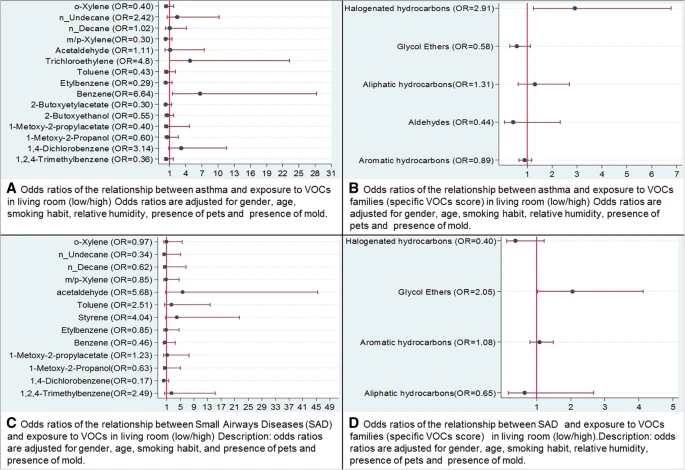- Original research article
- Open Access
Multidisciplinary Respiratory Medicine 14, Article number: 33 (2019)
Abstract
Introduction
Few investigations have related objective assessments of indoor air pollutants to respiratory health in farmers, in spite of the many rural environmental hazards to which they are exposed. Chemical air pollution has been particularly neglected.
Objective
We investigated the relationships of indoor exposure to particulate matter (PM) and volatile organic compounds (VOCs) to respiratory health in farmers.
Methods
Nineteen VOCs (5 families) and PM (from ultrafine to total suspended particles (TSP)) were objectively assessed in dwellings and workplaces in 109 French farmers during a week. To take into account multiple exposures, scores of exposure were computed for total VOCs and VOCs families. Individuals filled a standardized questionnaire and underwent spirometry with bronchodilation test.
Results
 |
| Adjusted odds ratios (OR) and confidence interval of the relationship between respiratory health and exposure to Volatile Organic Compounds (VOCs) in the living room |
On average, VOCs concentrations were higher in dwellings than in workplaces. The reverse was observed for PM. When considering the mean concentrations of air pollutants for the whole farm (dwellings + workplaces), asthma (9.3%) was positively associated with elevated exposure to benzene (adjusted odds-ratio (ORa) = 6.64, 95%CI: 1.56–28.27), trichloroethylene (4.80, 1.00–23.30) and halogenated hydrocarbons score (2.9, 95% 1.3–6.8). Early airway obstruction (FEF25–75 < 80%, with normal FEV1 and FVC and FEV/FVC ≥ 70%) (29.8%) was related to elevated exposure to 2-butoxyetylacetate (11.49, 1.55–85.37) and glycol ethers score (2.0; 1.0–4.1) in the whole farm and to PM2.5 (ORa = 5.26, 95% CI: 1.09–25.28) in the granary/stable. The risk of Chronic Obstructive Pulmonary Diseases (FEV/FVC < 70%) (COPD) (4.26%) was found to be larger with elevated exposure to aldehydes (OR = 3.95, 1.09–14.26).
Conclusion
Indoor chemical air pollution is detrimental to farmers’ respiratory health. More epidemiological investigations with detailed exposure assessments and clinical measures of respiratory effects are needed in rural settings to corroborate these findings.
No comments:
Post a Comment